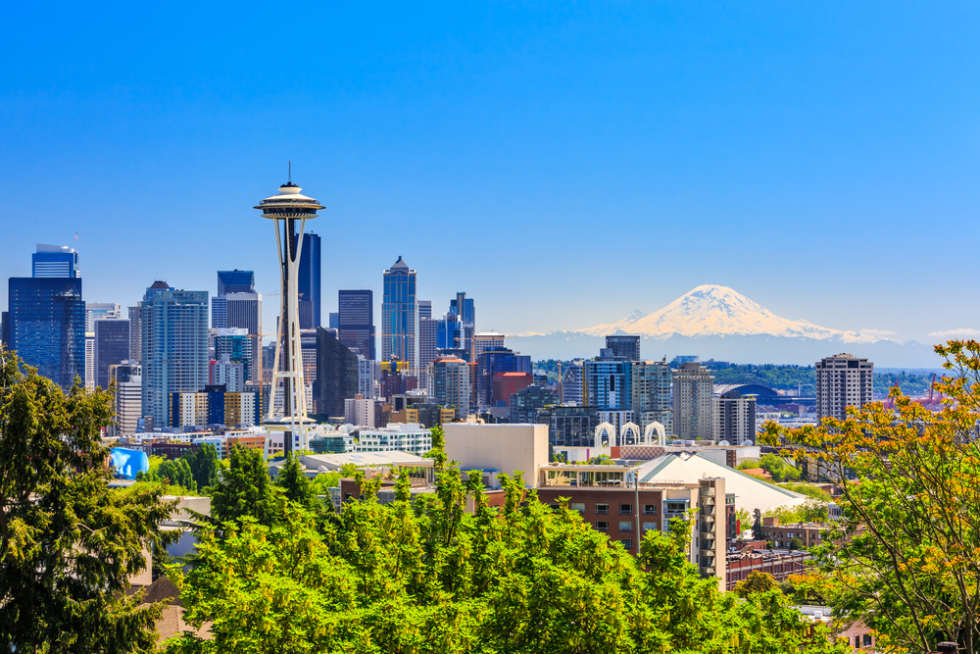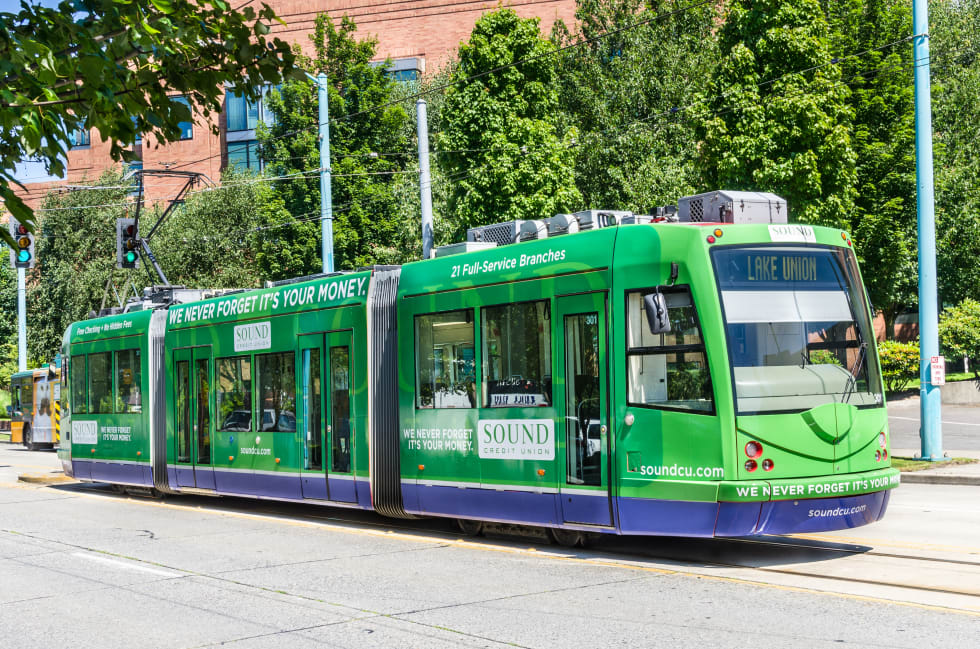The Ayer
- 46 units available
- Studio • 1 bed • 2 bed • 3 bed
- Amenities
In unit laundry, Patio / balcony, Granite counters, Hardwood floors, Dishwasher, Dogs allowed + more

Seattle is somewhat affordable for renters. As of July 2025, the median rent across all unit types in the city is $2,115, reflecting a 1.3% increase month-over-month and a 2.7% jump year-over-year, according to Apartment List. A typical one-bedroom apartment rents for $1,973, while two-bedroom units average $2,463. Rents in Seattle proper are now 4.3% higher than the metro-wide median of $2,027, showing stronger demand within city limits.
With new construction slowing down and vacancy rates tightening, the brief wave of lease incentives in early 2024 is quickly fading. Renters should expect fewer deals and faster competition, especially in walkable neighborhoods and buildings with modern amenities.

Seattle’s rental landscape continues to show moderate but steady growth. As of mid-2025:
The steady climb echoes early 2024 trends, which are much calmer than the explosive spikes of 2021 but still indicative of upward pressure. Developers also added heavy new supply in 2024, which helped stabilize prices, but building permits and new units have slowed sharply in 2025. This exhaustion in new construction means concessions are drying up, and competition for available units is rising. Forecasts indicate rent growth may slightly outpace national averages through 2025, driven by strong demand and fewer new units.
Rent in Seattle runs the gamut and what you’ll pay depends a lot on the neighborhood, the building’s appeal, and how much space you need. Whether you’re eyeing a slick downtown studio or a two-bedroom near Green Lake, here’s a snapshot of what renters are shelling out across the city right now.
| Bedrooms | Seattle Median Rent Price | National Median Rent Price | Savings vs. National (%) |
|---|---|---|---|
| 1-Bedroom | $1,973 | $1,231 | 0.603 |
| 2-Bedroom | $2,463 | $1,387 | $1 |
| All Units | $2,115 | $1,401 | $0.51 |
As of July, 2025, one-bedrooms average $1,973 in Seattle, or about 60% more than the national norm. Renters can expect higher prices in centrally located or amenity-rich buildings, especially in neighborhoods like Belltown, South Lake Union, and Capitol Hill. You’ll also pay a premium for apartment complexes with covered parking.
Two-bedroom apartments in Seattle average $2,463—nearly $1,100 above the national median. These units are popular among roommates and families, especially in communities offering outdoor space or transit access.
Seattle renters face a steep market, but affordability is still possible with the right budgeting strategy. Here's how it breaks down:
Here’s how Seattle compares in 2025:
| City | Average 1-Bedroom Rent | Cost of Living Index* |
|---|---|---|
| New York, NY | $5,015 | 172.5 |
| Los Angeles, CA | $3,461 | 245.5 |
| Atlanta, GA | $1,532 | 113.3 |
| Seattle, WA | $1,973 | 204 |
| Birmingham, AL | $1,516 | 87 |
| Columbus, OH | $1,454 | 91.4 |
*Cost of Living Index (U.S. average = 100) data sourced from BestPlaces.
It’s no surprise that Seattle sits on the pricier end, but you’re also getting access to major employers, Puget Sound views, and a city that consistently ranks high for quality of life.
Before diving into listings, take a beat to figure out what rent works for your budget. There’s no one-size-fits-all answer, but a few popular rules of thumb can help you set a healthy range.
The 30% rule is a classic for a reason: it says you shouldn’t spend more than 30% of your gross monthly income on rent. So if you earn $6,000 a month, your rent budget should be around $1,800. It’s easy math, but in a city like Seattle, where prices swing hard between neighborhoods, this rule works better as a guideline than a hard cap. Use it to ballpark your range, then flex based on what matters most to you.
The 50/30/20 rule gives your budget a bit more breathing room. It splits your after-tax income into 50% for essentials (like rent, groceries, and bills), 30% for wants, and 20% for savings or debt. Since rent is only part of that 50%, you’ll need to factor in the full cost of living in Seattle. You’ll need to consider the transportation, utilities, and that occasional $7 oat milk latte. It’s a solid framework if you want flexibility without losing track of your bigger financial goals.
Landlords typically follow the 3x rule where your monthly income should be at least 3x the rent. So if you're eyeing a $2,100 apartment in Seattle, you'll want to bring in around $6,300 a month. It’s not a legal requirement, but it does give landlords peace of mind that rent won’t be a stretch. If you fall a little short, solid references, a larger deposit, or a co-signer can still tip things in your favor.

Seattle’s overall cost of living is about 104% higher than the U.S. average, with housing as the biggest contributor. The Sperling’s Best Places index ranks Seattle at 204, meaning it’s more than twice as expensive as the baseline. Other costs, including groceries and healthcare, are also elevated, but not nearly as steep as housing and transportation.
Transportation is also a big expenditure in locals’ budgets. Between gas prices, car maintenance, and rising public transit fares, getting around adds up fast, especially if you commute. Bottom line: Seattle’s not a budget city, but with the right planning, you can still live comfortably.
Seattle’s utility costs are more manageable than many renters might expect, especially compared to other West Coast cities. On average, renters in Seattle spend $154.63 per month on electricity, $28.38 on gas, and $38.41 on water, with a small $1.13 for other fuels. That brings the total average monthly utility bill to about $222.54.
Electricity is by far the largest line item, partly due to Seattle’s long, dark winters and reliance on electric heating in many apartments. Water and sewer services are city-managed and moderately priced, while gas use is lower overall thanks to Seattle’s energy mix and mild climate. Keep in mind that these are averages; if your apartment is older, lacks insulation, or includes shared utility meters, your costs could be higher.
In addition to utilities, most renters should plan for $78 per month for internet and around $15 to $25 for renter’s insurance. If you own a car, expect to pay more for parking, gas, and insurance than the national average. Living in Seattle requires a bit more budgeting, but for many renters, the location and lifestyle make it worthwhile.
| Location | Avg Electricity Cost | Avg Gas Cost | Avg Water Cost | Avg Fuel Cost | Avg Total Cost |
|---|---|---|---|---|---|
| Seattle, WA | 154.63 | 28.38 | 38.41 | 1.13 | 222.54 |
| Washington | 170.06 | 48.14 | 36.91 | 1.07 | 256.18 |
| U.S. | 150.93 | 51.12 | 45.52 | 5.57 | 253.14 |
Where you rent in Seattle has a big impact on price. Apartment List reports that the citywide median is $2,115, but prices in some neighborhoods fall well below or above that number.
| Area | Starting 1-Bedroom Rent | Starting 2-Bedroom Rent | Best For |
|---|---|---|---|
| Lakewood | $1,544 | $2,001 | Military families, budget seekers, and commuters |
| Federal Way | $1,630 | $1,979 | Families, value seekers |
| Everett | $1,690 | $1,950 | College students, hybrid workers |
| Kent | $1,739 | $2,101 | College students, hybrid workers |
Looking to keep your rent under control without sacrificing quality of life? The Seattle metro includes several affordable options. Here's a snapshot based on current average rents:
| Neighborhood | 1-Bedroom Median Rent | 2-Bedroom Median Rent | % Below Median Seattle Rent | Best For |
|---|---|---|---|---|
| Lakewood | $1,544 | $2,001 | -21.7% / -18.8% | Military families, budget seekers, and commuters |
| Federal Way | $1,630 | $1,979 | -17.4% / -19.7% | Families, value seekers, light rail upcoming |
| Everett | $1,690 | $1,950 | -14.3% / -20.8% | College students, hybrid workers, waterfront |
| Kent | $1,739 | $2,101 | -11.8% / -14.7% | Young families, diverse communities |
Lakewood
Lakewood consistently ranks as one of the most affordable cities in the metro area. This suburb south of Tacoma is best known for its access to nature, including American Lake, Fort Steilacoom Park, and the Chambers Bay Trail. For renters who want space to stretch out and proximity to outdoor recreation, it’s an underrated gem.
Although it’s not exactly commuter-friendly without a car, Lakewood offers solid value for the price—especially for families, remote workers, and those stationed at nearby Joint Base Lewis-McChord. Housing options range from garden-style apartments to rental homes, and while the restaurant and retail scene is modest, it’s growing. If you’re looking to cut rent without cutting quality of life, Lakewood delivers.
Located roughly halfway between Seattle and Tacoma, Federal Way gives renters access to both job markets via I-5 and the soon-to-be-expanded Link light rail. It’s a hotspot for large apartment communities, with options ranging from basic to newly renovated—all at a fraction of Seattle’s cost.
Federal Way’s appeal lies in its practicality. It has everything you need—grocery stores, parks, schools, and medical offices—all without Seattle’s price tag or congestion. You won’t find a big nightlife scene, but you will find room to grow, especially if you’re sharing costs with a roommate or saving up for a future move. The ongoing downtown redevelopment project is also bringing fresh energy and amenities to the area.

Everett provides a small city feel with access to major employers with cheaper prices than most of Seattle. It’s also home to a Boeing manufacturing facility, a naval station, and a growing healthcare presence, which keeps the local economy steady and offers nearby job opportunities. The waterfront, historic downtown, and arts scene add personality and color.
This isn’t a sleepy suburb. Everett has its own character, from the Everett Farmers Market to waterfront breweries and summer concerts at Boxcar Park. The commute to Seattle can be long in traffic, but the Sounder train provides a scenic and reliable alternative. For renters looking for culture, affordability, and a sense of place, Everett is a strong contender north of the city.
Kent offers below average rents for Seattle and is quickly becoming one of the more dynamic budget-friendly cities in the region. Located in the Green River Valley, Kent has long been a center for manufacturing and logistics—but it’s also seeing a residential boom thanks to its proximity to Sea-Tac Airport, light rail expansion, and diverse food and shopping options.
Kent’s housing stock is broad and you’ll find everything from newer mid-rise apartment buildings to older duplexes and single-family homes for rent. For renters who value multicultural communities, easy freeway access, and a strong park system, Kent checks a lot of boxes. It’s especially attractive for couples and young families priced out of Seattle’s inner neighborhoods but still wanting quick access to downtown and the airport.

If you’re chasing skyline views, luxury finishes, or a short commute to tech campuses, Seattle’s high-end neighborhoods deliver, but at a cost. One-bedroom rents in these areas often top $2,500, and two-bedrooms can exceed $3,200, far above the metro average. Still, many renters find the walkability, school quality, and premium amenities worth the splurge.
Here are four of the most expensive places to rent in the Seattle area, and why they remain in high demand:
| Neighborhood | 1-Bedroom Median Rent | 2-Bedroom Median Rent | % Above Median Seattle Rent | Best For |
|---|---|---|---|---|
| South Lake Union | $2,813 | $4,427 | +33% / +109% | Families who want top-rated schools and space |
| Belltown | $3,278 | $5,050 | +55% / +139% | Nature lovers with tech jobs and remote hybrid |
| Ravenna | $3,285 | $4,142 | +55% / +96% | Renters seeking a quiet, residential feel with access to top-rated schools and parks. |
| Seattle Central Business District | $3,172 | $5,378 | +50% / +154% | Professionals who want to live steps from work, transit, and downtown amenities. |
Each of these neighborhoods commands a premium thanks to strong school districts, proximity to major employers, and a polished, suburban-urban feel.
South Lake Union is one of Seattle’s most in-demand neighborhoods. This lakeside district is anchored by Amazon’s headquarters and is packed with luxury apartment towers offering rooftop lounges, fitness centers, and modern design. Professionals in tech and healthcare are drawn to the area for its short commutes and work-life convenience.
Although it has a strong corporate feel, South Lake Union is not all business. The neighborhood also features lakeside parks, trendy coffee shops, and an impressive lineup of food trucks and breweries. With both green space and sleek high-rises, it offers a lifestyle that blends work, recreation, and modern urban living.

Ravenna is a quiet, tree-lined neighborhood in northeast Seattle where two-bedroom rents surpass $4,000. The area is known for its historic homes, peaceful parks, and access to top-rated schools, making it popular with renters who want a suburban atmosphere without leaving the city limits.
Living in Ravenna means enjoying slower mornings, weekend farmers markets, and a short walk to green spaces like Ravenna Park. It's also close to University Village and the University of Washington. While it doesn't offer the excitement of downtown, it provides renters with a sense of stability, safety, and charm.
Seattle’s Central Business District is the heart of the city and one of its most expensive places to live. Two-bedroom apartments offer luxury finishes, on-site amenities, and sweeping city or waterfront views. The location is ideal for those who want to be within walking distance of work, transit, and cultural institutions.
The CBD has a fast-paced vibe, with restaurants, theaters, and major employers packed into a walkable grid. Apartment units tend to be compact but efficient, appealing to professionals who prioritize access over space. For those who want a front-row seat to everything happening downtown, the CBD delivers convenience and style in equal measure.
Belltown is a high-rise haven for renters who want to be in the center of it all. The neighborhood is one of the most expensive in Seattle. It offers quick access to Pike Place Market, the waterfront, and a nightlife scene filled with rooftop bars and live music venues.
The area brings urban energy with a strong residential feel. Many buildings offer secure access, concierge service, and impressive views of Elliott Bay. Renters here often prioritize walkability and convenience, choosing Belltown for its location and lifestyle perks rather than large floor plans.

To afford the median rent of $2,115, renters should earn around $84,600/year, according to the 30% rule. But income alone isn’t the full picture. Households with roommates or fewer expenses can afford more rent, while those with student loans, kids, or car payments may need to stretch less.
Yes—beyond monthly rent, you’ll need to budget for upfront costs, add-on fees, and city-specific extras that can quickly drive up your move-in price. Here's what Seattle renters should expect:
Some buildings also charge for package lockers, trash valet, or amenities like gyms and rooftop access. Read the lease carefully—Seattle landlords are required to disclose all fees, but you’ll want to double-check for anything labeled “monthly” or “recurring.”
Seattle might not be known for cheap rent, but there are still smart ways to stretch your housing budget in this competitive market:
Move during the off-season: Rent prices usually dip between November and February when demand slows.
Consider nearby cities: Lakewood, Everett, and Kent offer one-bedroom apartments for $400 to $600 less than Seattle’s average.
Split a two-bedroom: Sharing with a roommate can save over $500/month compared to renting a one-bedroom solo.
Look for lease-up specials: New apartment buildings may offer free rent, waived deposits, or discounted parking to fill units quickly.
Negotiate before renewing: If your lease is ending, ask about staying at your current rate or getting a break for signing a longer lease term.
Track pricing trends: Use tools like Apartment List to monitor when prices dip in your desired neighborhood so you can act quickly.
You don’t need to spend weeks scrolling or settle for a place that doesn’t fit your budget. Neighborhoods like Ballard, Beacon Hill, and Northgate offer strong value, and with Apartment List’s personalized quiz, you can find Seattle apartments that match your budget, must-haves, and move-in timeline. Spend 5 minutes with us and save yourself 50 hours of searching.
Yes, renting is usually cheaper than buying in Seattle, especially if you’re thinking short-term. With high home prices, property taxes, and maintenance costs, monthly rent is typically lower unless you plan to stay put and build equity over time.
Yes, Seattle’s rental market is competitive, especially in popular neighborhoods. Low vacancy rates and slowing construction mean good units get scooped up fast. If you're apartment hunting, have your documents ready and be prepared to act quickly.
A livable wage in Seattle is about $54,700 per year for a single adult. That’s based on MIT’s Living Wage Calculator and reflects the income needed to cover housing, food, healthcare, and transportation without financial stress.
If you can’t afford rent in Seattle, there are still options. Look at more affordable areas like Lakewood, Everett, or Federal Way, or consider living with a roommate. You can also explore income-restricted housing or apply for rental assistance through local programs.
No, utilities are usually not included in Seattle rent. Most landlords expect tenants to pay separately for electricity, water, sewer, garbage, and internet. Some newer buildings may bundle a few of these, but always check the lease to confirm.
You typically need a credit score of 620 or higher to rent in Seattle. Some landlords may accept lower scores with extra conditions, like a co-signer or a higher deposit. Solid rental history also helps.
Yes, Seattle has plenty of short-term and furnished rental options. These are especially common near downtown, the University District, and major hospitals. Just expect to pay more for flexibility and convenience.
The best time to rent in Seattle is during the winter months. Between November and February, demand slows and landlords are more likely to offer move-in deals or lower rent. Summer has more listings but also higher prices and more competition.
Yes, Seattle is a very pet-friendly city. Many apartments welcome pets, but you’ll often pay extra—both a one-time deposit and monthly pet rent. Some buildings also have breed or weight restrictions, so ask in advance. You can also use Apartment List’s pet filters in your next apartment search to find the perfect place.
Yes, Seattle has renter protections, and some of the strongest in the country. The city requires 60 days’ notice for rent increases, restricts winter evictions, and offers support programs for tenants facing hardship. Know your rights—they matter here.

In unit laundry, Patio / balcony, Granite counters, Hardwood floors, Dishwasher, Dogs allowed + more
In unit laundry, Patio / balcony, Hardwood floors, Dishwasher, Pet friendly, Garage + more